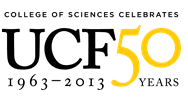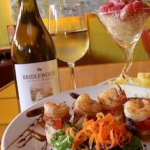Dinner date with a scientist
Imagine enjoying dinner and participating in a lively discussion with cutting-edge scientists about the ways lasers and nanoprobes are used in medical treatment, the impact of runoff water on the marine ecology, asteroids and their connection to the planet’s building blocks or the latest discoveries from a Mayan dig in Belize.
It happens the first Wednesday of every month in College Park, thanks to the Science Café Orlando. The event is free and food is available for purchase.
Science Café is a general description of an international movement that began five years ago in Europe and has taken off worldwide. Today, more than 200 science cafes operate worldwide including dozens in the United States. There are active cafes on the Space Coast, Daytona Beach and Tampa, as well.
The café sessions are informal talks with leading researchers aimed at bringing the latest developments in science and technology to the public, and showing how science is relevant to everyday life. Scientific jargon is kept to a minimum, but these are no watered-down sessions.
“They’re quite popular,” said Edward A. Haddad, executive director of the Florida Academy of Sciences, the nonprofit organization that organizes the sessions at Taste restaurant every month. “We get quite a cross section of people. We started small with about 20 people attending, and the last session on physics drew 85 people.”
This year, 10 professors from the College of Sciences at the University of Central Florida are providing their time and expertise to the Science Café.
“One of the joys of the sciences is that the work we do is important and – to many people – fascinating,” said Michael Johnson, dean of the college of sciences. “We thought that sharing some of our best research in the community through the Science Cafe would be a great way to celebrate UCF’s 50th birthday.” 
Scientists are eager to share what they do and why it matters, he said. UCF professors have been active participants in the sessions for years, including Costas Efthimiou, a physics professor who gave a talk in September titled “A Theory About Everything.”
“Some of the most important questions of our time – climate change, energy policy, economic progress, etc. – depend crucially on scientific research,” Johnson said. “In a democracy, it is the citizens exercising their vote who set the country’s direction – and it is the responsibility of the scientific community to share important discoveries with interested people.”
Haddad is thrilled about the partnership with UCF.
“The Science Café is just one of many avenues the Florida Academy of Sciences uses to help improve the understanding of science in the community,” Haddad said. “We’re thrilled UCF is participating so heavily this year. I think the entire community will benefit.”
 The public is invited to the free talks at Taste restaurant in College Park. Meals are optional. The talks begin at 7 p.m., but most people arrive earlier to enjoy the food.
The public is invited to the free talks at Taste restaurant in College Park. Meals are optional. The talks begin at 7 p.m., but most people arrive earlier to enjoy the food.
Some of the college’s most interesting faculty members will be making presentations in the coming months. The speakers are:
Linda Walters, Biology, Oct. 3, 7 p.m.
Walter’s research focuses on human impacts in the marine environment. She is interested in both pure ecology questions and goal-based conservation issues for a wide range of marine and estuarine habitats in the Caribbean and the southeastern United States, especially the Indian River Lagoon system and the Florida Keys. She’s been featured in national publications and Volusia County declared a Linda Walters Day in appreciation for her efforts to preserve the marine environment in the area.
Kevin Belfield, Chemistry, Nov. 7, 7 p.m.
Belfield is chair of the Chemistry Department and a Pegasus Professor. He designs nanostructured materials for 3-D optical data storage, multiphoton fluorescent probes and bio-imaging for early tumor detection and image-guided surgery, photodynamic therapy agents, nanostructured functional organic and polymeric materials, and photochromic materials.
Jim Wright, Sociology, Dec. 5, 7 p.m.
Wright is an author, educator, and the Provost’s Distinguished Research Professor in the Department of Sociology. He has published 21 books and more than 300 journal articles, book chapters, essays, reviews, and polemics on topics ranging from poverty to homelessness to guns in America to NASCAR.
Humberto Campins, Physics, Jan. 9, 7 p.m.
Campins is an international expert on asteroids and comets. He was on the first team that discovered asteroids had water and he is a member of two teams that will be sending spacecraft to collect samples in the next five years. He is a Provost Research Professor of Physics and Astronomy and head of the Planetary and Space Science Group.
Eduardo Salas, Psychology, Feb. 6, 7 p.m.
Salas is a national expert in team dynamics and why they are important. He is a University Trustee Chair and Pegasus Professor of Psychology at UCF. He also holds an appointment as program director for Human Systems Integration Research Department at UCF’s Institute for Simulation & Training. He was a senior research psychologist and head of the Training Technology Development Branch of NAVAIR-Orlando for 15 years.
Talat Rahman, Physics, March 6, 7 p.m.
Rahman is a theoretical physicist and the chair of the physics department. Rahman is internationally renowned for her research in computational nanoscience. Her research finds ways to engineer materials at the nanoscale with optical, magnetic, vibrational, and chemical properties needed for a variety of applications – “building” the materials on the computer, atom by atom. She is a Pegasus Professor.
Peter Hancock, Psychology, April 3, 7 p.m . (tentative)
Hancock’s research expertise is in the area of stress, workload and performance. He has written multiple books and conducted several studies that look at the impact of stress on the human psyche and on performance. He is a Pegasus Professor and Provost Distinguished Research Professor in the Department of Psychology and the Institute for Simulation & Training, as well as at the Department of Civil and Environmental Engineering and the Department of Industrial Engineering and Management Systems at UCF, where he is the director of the MIT2 Research Laboratories.
Arlen and Diane Chase, Anthropology, May 1, 7 p.m.
When Arlen and Diane Chase first traveled to Caracol in 1983, the city was covered by Belizean jungle. In more than 25 years of research, the husband-and-wife anthropologists have pieced together what Diane describes as “a much more complete story about Caracol,” one of the largest Mayan cities. Arlen Chase is chair of the Department of Anthropology and a Pegasus Professor. Diane Chase is the executive vice provost and a Pegasus Professor.
